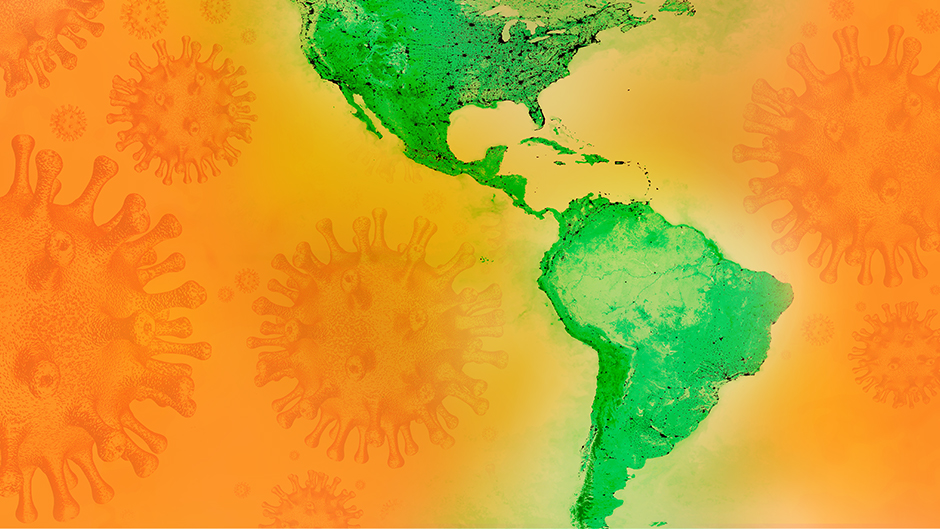RIO DE JANEIRO, BRAZIL – Although America has already administered more than 648 million doses of covid vaccine, more than half of them have been administered in only one country, the United States, so international organizations are warning about the delay in the region, while expectations are growing for the approval of the first Latin American vaccine.
These are the keys to vaccination this week in the Americas:
1. CUBA, FIRST LATIN AMERICAN COUNTRY WITH ITS OWN VACCINE
Cuba became the first Latin American country with its own vaccine against Covid-19: the Abdala compound, which, with an efficacy of 92.2% in clinical trials, received this Friday the authorization for emergency use in the country and is expected to be distributed soon in the region.
It becomes the first vaccine created in Latin America, where only a minority of countries work with their own formulas, and the disease is fought with those imported from the United States, Germany, the United Kingdom, Russia, or China.
Abdala’s authorization comes in the midst of a health crisis in Cuba and other countries in the region, suffering the third wave of contagions.
2. MILLIONS OF PEOPLE DO NOT KNOW WHEN THEY WILL BE ABLE TO BE VACCINATED
As of Friday (9), the Americas have administered some 648.89 million doses of vaccines against Covid-19, according to the Pan American Health Organization (PAHO).
The largest number have been administered in the United States (more than 333 million), followed by Brazil (95.6 million), Mexico (45.8 million), Canada (38 million), Chile (22.8 million), Argentina (21.3 million), Colombia (18.2 million), Dominican Republic (7.8 million), Peru (7.5 million) and Ecuador (4.2 million).
Based on these figures, PAHO estimates that one in four people on the continent “has completed their vaccination schedule”, but more than half of the doses have been administered in only one country: the USA.
Although 50% of the populations of Chile and Uruguay have completed their vaccination schedule and Canada has covered more than 30%, millions of people, especially in Latin America, “still do not know when they will have the opportunity to be vaccinated.”
3. THE THIRD DOSE DEBATE
Pfizer/BioNTech confirmed that they would seek approval in the United States for a third (booster) dose of their vaccine to offer greater protection against Covid-19.
According to the companies, they have seen “encouraging data” from an ongoing trial of the booster vaccine and added that it provides five- to 10-fold higher levels of neutralizing antibodies when administered six months after the second dose.
However, the European Medicines Agency (EMA) says it is “too early to confirm” whether a third dose of the vaccines is needed, because “there is insufficient data” to estimate the actual duration of protection.
Before this debate, and although PAHO asked to prioritize the application of the first two doses, the Dominican Republic began in July to administer the third dose, starting with doctors, health personnel, and older adults, which will be from a different laboratory to those initially received by each person.
4. COVAX CONFIRMS IT RECEIVED MONEY FROM VENEZUELA FOR VACCINES
The GAVI Foundation, administrator together with the World Health Organization (W.H.O.) of the Covax program for the global distribution of antiviral vaccines, confirmed on Thursday (8) that it had received funds from Venezuela needed to ship doses to that country apparently blocked by sanctions.
Due to U.S. trade and financial sanctions against the country, the Venezuelan government had denounced that its payment to Covax was blocked, which prevented the arrival of 11 million vaccines agreed in April.
The Venezuelan ambassador to the United Nations in Geneva, Hector Constant, even took the matter to the Human Rights Council and put it as an example of the “crime against humanity” against Venezuela that these economic sanctions constitute.
5. ONLY 3% IN CENTRAL AND SOUTH AMERICA HAVE COMPLETED VACCINATIONS
The Americas, the continent most affected by the pandemic, reports 73.4 million infected people as of Friday and is approaching 2 million deaths due to Covid-19. Of this total, some 40 million cases and 1.3 million deaths correspond to Latin America.
Although this continent reports nearly half of the deaths registered worldwide, in some Central and South American countries, only 3% of the population has completed its vaccination schedule so far, according to the W.H.O.
6. SEVERAL LATIN AMERICAN COUNTRIES RECEIVE DONATIONS FROM THE U.S.
Uruguay received on Thursday (8) 500,000 doses of the Pfizer vaccine from the U.S., the eleventh Latin American country to receive a donation of vaccines within the 80 million doses that President Joe Biden promised to share with other countries, of which more than 20 million are for Latin American and Caribbean nations.
The shipment to Uruguay coincides with those to Bolivia, Paraguay, and Guatemala, which received this week, respectively, 1 million single-dose vaccines from Johnson & Johnson, 1 million doses from Pfizer, and 1.5 million doses from Moderna. At the same time, it was announced today that others would be sent to Haiti as soon as the crisis unleashed by the assassination of President Jovenel Moise is resolved.
7. STUDENTS AND TEACHERS VACCINATED IN THE U.S. DO NOT NEED MASKS
Students and teachers vaccinated in the United States, the country with the highest number of cases and deaths due to the virus (33.8 million infections and more than 606,000 deaths), will not need to wear masks inside schools, according to a new guideline issued by the Centers for Disease Control and Prevention (CDC).
The agency ruled out, however, recommending that schools require their teachers or students to be vaccinated but assured that uninoculated persons should continue to wear masks inside schools.


